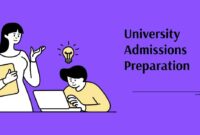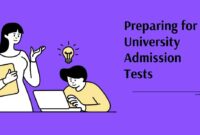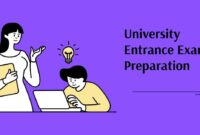Picture this: Sarah sits in her bedroom in London, staring at her university application deadline that’s just weeks away. She’s dreamed of studying medicine at Cambridge since she was twelve, but the thought of admission exams makes her stomach twist with anxiety. Sound familiar? You’re not alone in this journey.
University admission exams can feel overwhelming, but with the right college admission exam strategies, you can transform that anxiety into confidence. Whether you’re preparing for A-levels, International Baccalaureate, or other entrance tests, this guide will show you how to master these crucial stepping stones to your academic future.
Understanding University Admission Exams
Before diving into specific tactics, let’s break down what you’re really facing. University entrance exams aren’t just about testing your knowledge – they’re designed to assess your readiness for higher education challenges.
Most European universities use a combination of standardized tests, subject-specific exams, and continuous assessment. Countries like Germany rely heavily on the Abitur, while France uses the Baccalauréat system. The UK has its A-levels and Scotland its Highers. Understanding your specific exam format is the first step in developing effective university entrance test tactics.
These exams typically evaluate:
- Critical thinking abilities
- Subject-specific knowledge
- Problem-solving skills
- Time management under pressure
- Written communication skills
Creating Your Study Foundation
Your success starts with building a solid foundation. This means understanding your learning style, setting realistic goals, and creating an environment that supports your academic growth.
1. Assess Your Current Level
Start by taking practice tests to understand where you stand. Most students are surprised by this initial assessment – some discover they’re further along than expected, while others realize they need more preparation time than originally planned.
Create a skills inventory by listing subjects you feel confident about versus those that challenge you. Be honest with yourself. This isn’t about being perfect; it’s about knowing your starting point so you can create realistic higher education exam success methods.
2. Set SMART Goals
Your goals should be Specific, Measurable, Achievable, Relevant, and Time-bound. Instead of saying “I want to do well on my exams,” try “I will improve my mathematics score by 15 points over the next three months by completing two practice problems daily.”
Break down big goals into smaller, weekly targets. This makes your academic entry test plans feel less overwhelming and gives you regular opportunities to celebrate progress.
3. Design Your Study Space
Your environment directly impacts your focus and retention. Choose a quiet area with good lighting, comfortable seating, and minimal distractions. Keep your phone in another room during study sessions – research shows that even having it nearby can reduce concentration by up to 10%.
Organize your materials so everything has a place. When you don’t waste time searching for notes or textbooks, you maintain momentum and focus.
Advanced Preparation Techniques
Once your foundation is solid, it’s time to implement more sophisticated university selection exam approaches that will set you apart from other candidates.
These techniques go beyond basic studying and tap into cognitive science principles that enhance learning and retention.
1. Active Recall Training
Instead of passively reading notes, actively test yourself. Close your textbook and try to explain concepts out loud as if teaching a friend. This forces your brain to retrieve information, strengthening neural pathways.
Create flashcards for key concepts, but use them strategically. Don’t just flip through them – predict the answer before looking, and spend more time on cards you get wrong.
2. Spaced Repetition System
Your brain forgets information on a predictable curve. Combat this by reviewing material at increasing intervals: after one day, then three days, then a week, then two weeks.
Use apps like Anki or create your own schedule. The key is reviewing information just as you’re about to forget it, which strengthens long-term retention more than cramming ever could.
3. Interleaving Different Topics
Instead of studying one subject for hours, mix different topics within the same session. This technique, called interleaving, helps your brain make connections between concepts and improves problem-solving abilities.
For example, spend 30 minutes on history, then switch to mathematics, followed by literature. This approach mirrors how you’ll encounter questions on actual exams.
Subject-Specific Strategies
Different subjects require different approaches. What works for mathematics won’t necessarily work for literature, so you need targeted college application exam tactics for each area.
Understanding these subject-specific nuances can dramatically improve your performance across all areas of testing.
1. STEM Subjects (Science, Technology, Engineering, Mathematics)
For STEM subjects, focus on understanding underlying principles rather than memorizing formulas. Work through problems step-by-step, explaining your reasoning at each stage.
Create formula sheets but don’t rely on them during practice. The goal is to understand when and why to use specific formulas, not just to memorize them. Practice problems should progress from basic applications to complex, multi-step challenges.
Form study groups where you explain concepts to each other. Teaching others is one of the most effective ways to identify and fill knowledge gaps.
2. Humanities and Social Sciences
These subjects require strong analytical and writing skills. Practice breaking down complex texts into main arguments and supporting evidence. Learn to identify author bias and evaluate source credibility.
Develop a system for organizing information chronologically, thematically, or by cause and effect, depending on the subject. History benefits from timeline approaches, while literature might use thematic analysis.
Write practice essays under timed conditions. Start with broad outlines, then gradually add detail and refinement. Focus on clear thesis statements and logical argument progression.
3. Language Arts and Literature
Reading comprehension forms the backbone of these subjects. Practice active reading by summarizing paragraphs in your own words and predicting what comes next.
Expand your vocabulary systematically. Learn new words in context rather than from lists. Read diverse texts – newspapers, novels, academic articles – to encounter words in different contexts.
For writing sections, develop a bank of sentence structures and transition phrases. This gives you tools to express ideas clearly under time pressure.
Time Management and Test-Taking Skills
Even with excellent subject knowledge, poor time management can derail your performance. These campus entry exam preparation strategies focus on maximizing your efficiency during actual exams.
Effective time management during exams often makes the difference between good and excellent scores, regardless of your knowledge level.
1. Develop Test-Taking Rhythms
Practice exams under realistic conditions. Use the same time limits, take breaks only when allowed, and resist the urge to check answers online during practice sessions.
Learn to recognize when you’re spending too much time on a single question. Develop a “parking” system – mark difficult questions and return to them after completing easier ones.
2. Strategic Question Approach
Read all instructions carefully before starting. Many students lose points due to misunderstanding requirements, not lack of knowledge.
For multiple-choice questions, eliminate obviously wrong answers first. This improves your odds even when you’re unsure of the correct answer.
For essay questions, spend 5-10 minutes outlining before you start writing. A clear structure will keep you focused and help you manage time effectively.
3. Manage Test Anxiety
Physical preparation matters as much as mental preparation. Get adequate sleep, eat properly, and arrive at the test location early to reduce stress.
Develop breathing techniques for moments when anxiety peaks. Simple box breathing (inhale for 4 counts, hold for 4, exhale for 4, hold for 4) can reset your nervous system quickly.
If you find yourself panicking during the exam, take a 30-second break. Close your eyes, breathe deeply, and remind yourself that you’ve prepared well.
Technology and Resources
Modern students have access to incredible digital tools that can enhance traditional study approaches. These admission test winning methods leverage technology to create more effective learning experiences.
The key is using technology strategically, not letting it become a distraction from focused study.
1. Digital Study Tools
Online platforms like Khan Academy, Coursera, and EdX offer free courses that can supplement your regular studies. These often include video explanations that can clarify difficult concepts.
Use apps like Forest or Cold Turkey to block distracting websites during study sessions. These tools help maintain focus in our hyperconnected world.
Grammar and writing tools like Grammarly can help improve your writing, but don’t become dependent on them. Use them as learning aids, paying attention to the corrections they suggest.
2. Online Practice Resources
Many universities provide sample questions and past papers on their websites. These are goldmines for understanding question formats and difficulty levels.
Join online study communities, but choose them carefully. Look for groups focused on academic discussion rather than complaint sessions or anxiety sharing.
Create digital flashcards for concepts you struggle with. Apps like Quizlet allow you to study anywhere and often include audio features that help with pronunciation and retention.
3. Virtual Study Groups
Connect with other students preparing for similar exams through video conferencing platforms. This expands your study network beyond your immediate geographic area.
Schedule regular virtual study sessions with specific agendas. Unfocused online meetings can waste time, but structured sessions can be incredibly productive.
Use collaborative tools like Google Docs to share notes and create group study guides. This distributes the workload and exposes you to different perspectives on the same material.
Building Mental Resilience
Academic testing success approaches must include strategies for maintaining psychological well-being throughout your preparation journey. Mental resilience often determines long-term success more than raw intelligence.
Your mental state affects everything from memory retention to problem-solving ability, making this aspect of preparation crucial.
1. Maintain Perspective
Remember that admission exams are important, but they don’t define your worth or determine your entire future. Many successful people took non-traditional paths to their goals.
Set realistic expectations. Aiming for perfection creates unnecessary pressure, while setting achievable goals builds confidence and momentum.
Celebrate small victories along the way. Improved scores, better time management, or simply maintaining consistency deserves recognition.
2. Develop Coping Strategies
Create a support network of family, friends, teachers, and counselors. Don’t hesitate to ask for help when you need it – seeking support is a sign of wisdom, not weakness.
Learn to distinguish between productive worry and destructive anxiety. Productive worry motivates action, while destructive anxiety paralyzes. When you notice unproductive worry patterns, redirect that energy into concrete study actions.
3. Maintain Balance
Schedule regular breaks and recreational activities. Your brain needs downtime to consolidate information and maintain peak performance.
Exercise regularly, even if it’s just a daily walk. Physical activity reduces stress hormones and improves cognitive function.
Don’t neglect social connections. Isolation can increase anxiety and reduce motivation. Maintain friendships and family relationships throughout your preparation period.
Final Preparation Phase
As exam dates approach, your university exam preparation strategies should shift from learning new material to consolidating knowledge and fine-tuning performance. This phase requires different tactics than earlier preparation stages.
The final weeks before your exams are about optimization, not cramming new information.
1. Review and Consolidation
Focus on reviewing material you’ve already studied rather than learning new concepts. Your brain needs time to solidify existing knowledge.
Create summary sheets for each subject, condensing key information into easily reviewable formats. These become valuable resources for final review sessions.
Take full-length practice exams under realistic conditions. This helps you identify any remaining weak areas and builds stamina for the actual test day.
2. Logistics and Preparation
Confirm all exam details: dates, times, locations, required materials. Create a checklist to ensure you don’t forget anything important.
Plan your exam day schedule, including travel time, meal plans, and arrival time. Reduce decision-making on exam day by planning these details in advance.
Prepare all necessary materials the night before each exam. Pack extra pens, pencils, calculators (with fresh batteries), and any permitted reference materials.
3. Final Mindset Adjustments
Trust your preparation. By this point, you’ve put in significant work, and additional cramming is more likely to increase anxiety than improve performance.
Visualize success, but also prepare for challenges. Mental rehearsal of both optimal performance and problem-solving can increase confidence and reduce test-day surprises.
Get adequate sleep in the days leading up to your exams. Sleep deprivation severely impacts cognitive function, memory recall, and emotional regulation.
For comprehensive guidance on preparing for these crucial exams, you might find additional insights in our university entrance exam preparation guide which covers essential study techniques in detail.
Remember that success in university admission exams isn’t just about intelligence – it’s about strategy, preparation, and mental resilience. The techniques outlined here represent proven approaches used by thousands of successful students across Europe and beyond.
Your journey toward higher education is challenging, but with the right strategies and consistent effort, you can achieve your academic goals. For more detailed tactics and specific approaches, explore our complete university entry exams strategies guide to further enhance your preparation.
Stay focused, trust your preparation, and remember that every expert was once a beginner. Your future university success starts with the steps you take today.



